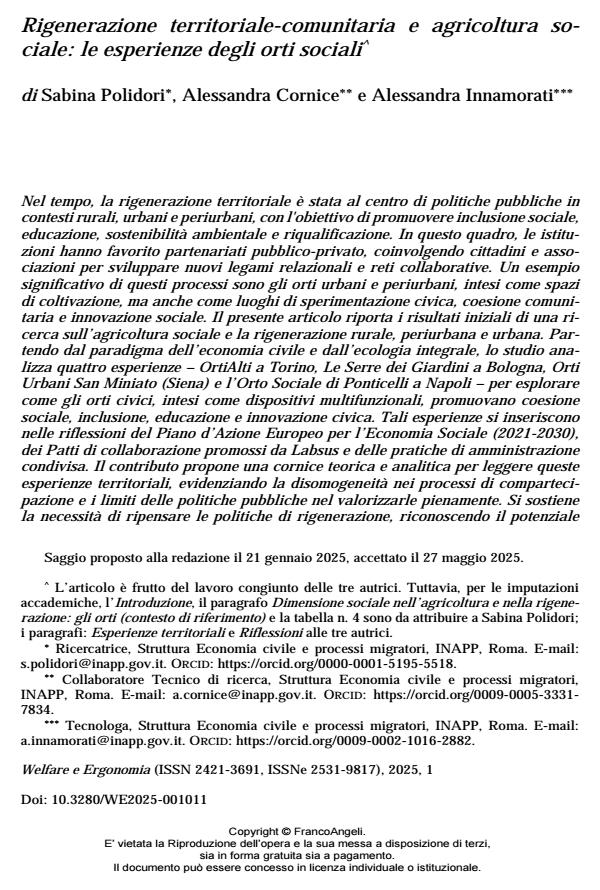Community-based territorial regeneration and social agriculture: The experiences of social gardens
Journal title WELFARE E ERGONOMIA
Author/s Sabina Polidori, Alessandra Cornice, Alessandra Innamorati
Publishing Year 2025 Issue 2025/1
Language Italian Pages 24 P. 167-190 File size 180 KB
DOI 10.3280/WE2025-001012
DOI is like a bar code for intellectual property: to have more infomation
click here
Below, you can see the article first page
If you want to buy this article in PDF format, you can do it, following the instructions to buy download credits

FrancoAngeli is member of Publishers International Linking Association, Inc (PILA), a not-for-profit association which run the CrossRef service enabling links to and from online scholarly content.
Over time, territorial regeneration has been at the core of public policies in rural, urban, and peri-urban contexts, with the aim of promoting social inclusion, education, environmental sustainability, and spatial redevelopment. Within this framework, institutions have supported public-private partnerships involving citizens and associations to foster new social ties and collaborative networks. A significant example of these processes is found in urban and peri-urban gardens, conceived not merely as spaces for cultivation, but as arenas for civic experimentation, community cohesion, and social innovation. This article presents the initial findings of a research project on social agriculture and rural, peri-urban, and urban regeneration. Drawing on the paradigms of civil economy and integral ecology, the study analyzes four case studies – OrtiAlti in Torino, Le Serre dei Giardini in Bologna, San Miniato Urban Gardens (Siena), and the Social Garden of Ponticelli in Naples – to explore how civic gardens, as multifunctional devices, foster social cohesion, inclusion, education, and civic innovation. These experiences are contextualized within the reflections of the European Action Plan for the Social Economy (2021-2030), the collaboration pacts promoted by Labsus, and practices of shared governance. The contribution proposes a theoretical and analytical framework to interpret these territorial experiences, highlighting the heterogeneity of co-participation processes and the limitations of public policies in fully enhancing them. It argues for a rethinking of regeneration policies, acknowledging the transformative potential of gardens and other civic spaces for sustainable, civil, and integrated development.
Keywords: social agriculture; shared administration; social gardens; public policy; land regeneration; Third sector.
Sabina Polidori, Alessandra Cornice, Alessandra Innamorati, Rigenerazione territoriale-comunitaria e agricoltura sociale: le esperienze degli orti sociali in "WELFARE E ERGONOMIA" 1/2025, pp 167-190, DOI: 10.3280/WE2025-001012